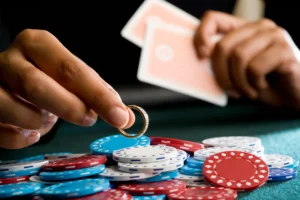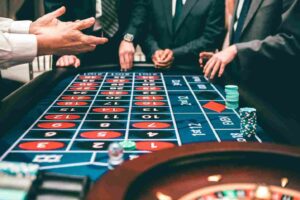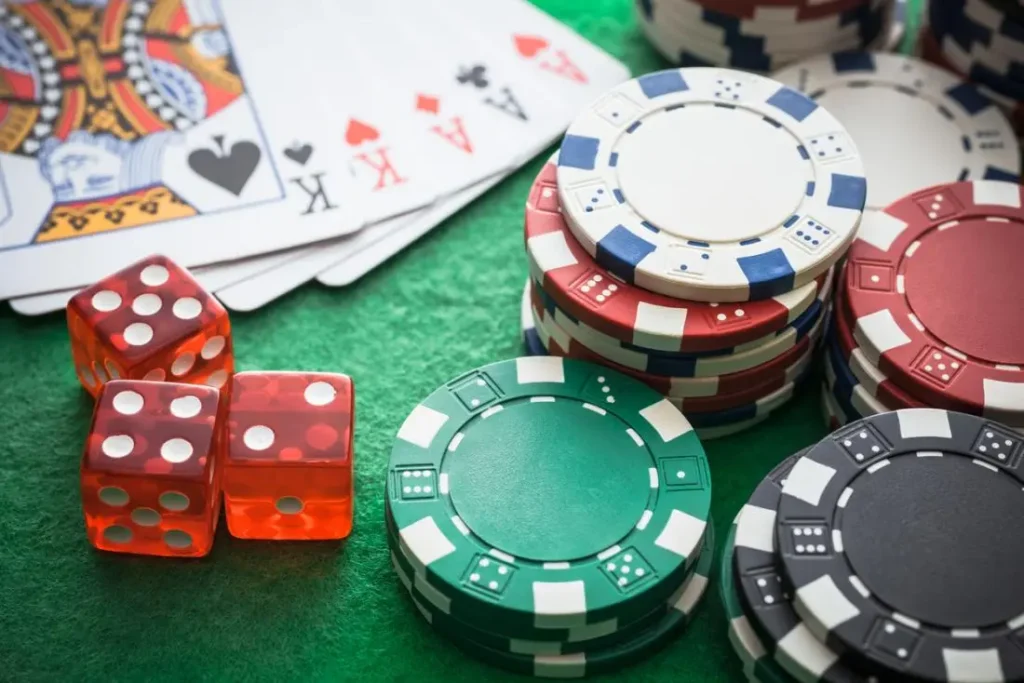In the glittering world of casinos, the allure of easy money often masks a darker reality: the gripping struggle of compulsive gambling. What starts as harmless fun can quickly spiral into a consuming addiction, wreaking havoc on finances, relationships, and mental well-being. In this blog, we delve into the depths of compulsive gambling, shedding light on its causes, consequences, and most importantly, strategies for overcoming its grasp.
Contents
What Is Compulsive Gambling?
 Compulsive gambling is also known as gambling disorder or pathological gambling. It is a progressive addiction characterized by an uncontrollable urge to gamble despite negative consequences. It transcends occasional betting or recreational gambling, manifesting as a compulsive need to wager increasing amounts of money in pursuit of the elusive thrill of winning. Individuals with compulsive gambling often experience a loss of control over their gambling behavior. Hence, leading to detrimental effects on their finances, relationships, and overall well-being.
Compulsive gambling is also known as gambling disorder or pathological gambling. It is a progressive addiction characterized by an uncontrollable urge to gamble despite negative consequences. It transcends occasional betting or recreational gambling, manifesting as a compulsive need to wager increasing amounts of money in pursuit of the elusive thrill of winning. Individuals with compulsive gambling often experience a loss of control over their gambling behavior. Hence, leading to detrimental effects on their finances, relationships, and overall well-being.
At its core, compulsive gambling is a disorder of impulse control, rooted in a complex interplay of psychological, biological, and environmental factors. It is not merely about the act of gambling itself but rather about the compulsive need to engage in it despite adverse consequences. This relentless pursuit of gambling activities can lead to severe personal and societal ramifications.
What Are The Symptoms To Identify?
Symptoms of compulsive gambling can vary in intensity and manifestation, but they typically include:
- Preoccupation with Gambling: Constantly thinking about past gambling experiences, planning future bets, or devising strategies to obtain money for gambling.
- Inability to Control Gambling: Difficulty in limiting or stopping gambling, even when aware of its negative consequences.
- Increasing Bet Size: Needing to gamble with larger amounts of money or more frequent bets to achieve the desired excitement or “high.”
- Restlessness or Irritability: Feeling restless or irritable when attempting to cut back or stop gambling.
- Chasing Losses: Continuously trying to recoup previous gambling losses by increasing bets or chasing after further wins.
- Lying or Hiding Gambling Behavior: Lying to conceal the extent of gambling involvement from family, friends, or therapists.
- Borrowing Money for Gambling: Resorting to borrowing money from others, selling possessions, or taking out loans to finance gambling activities.
- Neglecting Responsibilities: Neglecting work, school, family, or social obligations in favor of gambling.
- Mood Swings: Mood swings ranging from euphoria during wins to extreme depression or agitation during losses.
These symptoms collectively contribute to a pattern of compulsive gambling behavior that can significantly impair an individual’s personal, financial, and emotional well-being. If you or someone you know exhibits several of these symptoms, seeking professional help and support is crucial.
What Causes To Compulsive Gambling Disorder?
 The development of compulsive gambling disorder is influenced by a combination of biological, psychological, and environmental factors:
The development of compulsive gambling disorder is influenced by a combination of biological, psychological, and environmental factors:
Biological Factors
Genetic predisposition plays a significant role in the susceptibility to compulsive gambling. Studies suggest that individuals with a family history of gambling disorder may be more vulnerable to developing the condition due to inherited traits related to impulse control and reward processing.
Psychological Factors
Psychological factors such as personality traits (e.g., impulsivity, sensation-seeking) and underlying mental health conditions (e.g., depression, anxiety, ADHD) can contribute to the development of compulsive gambling. Some individuals may turn to gambling as a means of coping with stress, boredom, or negative emotions, leading to the reinforcement of addictive behavior.
Environmental Factors
Environmental influences, including early exposure to gambling, societal attitudes toward gambling, and the availability of gambling opportunities, can shape an individual’s gambling behavior. Cultural norms that glamorize or normalize gambling may increase the likelihood of developing a gambling disorder. Additionally, life stressors can trigger or exacerbate compulsive gambling tendencies.
Neurobiological Mechanisms
Compulsive gambling disorder involves dysregulation of brain pathways related to reward processing, decision-making, and impulse control. Dysfunction in neurotransmitter systems, such as dopamine, serotonin, and norepinephrine, may contribute to the reinforcing effects of gambling and the inability to control impulses.
Overall, the interplay of these factors contributes to the complex etiology of compulsive gambling disorder, highlighting the need for a comprehensive understanding and tailored interventions to address its underlying causes.
How To Overcome Compulsive Gambling?
Overcoming compulsive gambling involves a multifaceted approach that addresses the underlying condition. Here are some strategies to consider:
- Acknowledge the Problem
The first step towards recovery is recognizing and accepting that compulsive gambling has become a problem. This requires honesty and self-reflection to understand the impact of gambling on your life and relationships.
- Seek Professional Help
Consult with a therapist or counselor who specializes in treating gambling addiction. Cognitive-behavioral therapy (CBT) is often effective in addressing distorted thinking patterns, managing urges, and developing coping skills to prevent relapse.
- Join Support Groups
Participating in support groups such as Gamblers Anonymous can provide a sense of camaraderie, encouragement, and accountability. Sharing experiences with others who have struggled with similar issues can offer valuable insights and motivation for recovery.
- Develop Healthy Coping Strategies
Identify healthier ways to cope with stress, boredom, or negative emotions without resorting to gambling. Engage in activities that promote relaxation, such as exercise, mindfulness, hobbies, or spending time with loved ones.
- Limit Access to Gambling
Take practical steps to limit exposure to gambling triggers by avoiding casinos, online gambling sites, or other venues where gambling occurs. Install blocking software on electronic devices to prevent access to gambling websites.
- Manage Finances Responsibly
Take control of your finances by creating a budget, monitoring spending, and avoiding situations where you may be tempted to gamble with money you cannot afford to lose. Consider seeking financial counseling or debt management assistance if needed.
- Build a Supportive Network
Surround yourself with supportive friends and family members who understand your struggles and encourage your efforts towards recovery. Communicate openly with loved ones about your challenges and accomplishments in overcoming compulsive gambling.
- Practice Self-Care
Prioritize self-care by attending to your physical, emotional, and mental well-being. Get adequate sleep, eat a balanced diet, exercise regularly, and engage in activities that bring you joy and fulfillment.
- Stay Committed to Recovery
Recovery from compulsive gambling is a lifelong journey that requires ongoing commitment, patience, and perseverance. Celebrate small victories, learn from setbacks, and stay focused on your goals of living a healthier, happier life free from the grip of addiction.
Remember that overcoming compulsive gambling is possible with determination, support, and professional guidance. By taking proactive steps towards recovery and making positive changes in your life, you can reclaim control and rebuild a fulfilling, gambling-free future.
How To Help A Gambling Addict?
 Supporting a gambling addict can be challenging, but there are several ways you can help.
Supporting a gambling addict can be challenging, but there are several ways you can help.
Practical tips
Below are some of the best tips for helping a gambling addict:
Educate Yourself
Take the time to educate yourself about gambling addiction and its effects. Understanding the nature of the disorder will help you provide informed support and empathy to the individual struggling with addiction.
Encourage Professional Help
Encourage the gambling addict to seek professional help from therapists, counselors, or support groups specializing in gambling addiction. Offer to assist them in finding resources and scheduling appointments if needed.
Be a Good Listener
Create a safe and non-judgmental space for the individual to express their feelings and concerns about their gambling behavior. Practice active listening and validate their experiences without offering unsolicited advice or criticism.
Set Boundaries
Establish clear boundaries to protect yourself and others from the negative consequences of the individual’s gambling addiction. This may include setting limits on financial assistance, refusing to cover up or enable their gambling behavior, and prioritizing their well-being.
Offer Practical Support
Provide practical assistance in managing day-to-day tasks, such as helping with financial management, organizing schedules, or accompanying them to therapy sessions. Offer encouragement and reinforcement for positive steps taken towards recovery.
Avoid Enabling Behavior
Refrain from enabling the individual’s gambling addiction by providing financial bailouts. And, making excuses for their behavior, or minimizing the severity of their problems. Instead, encourage accountability and responsibility for their actions.
Express Concern with Compassion
Express your concerns about the individual’s gambling addiction in a caring and compassionate manner. Use “I” statements to communicate your observations and feelings without placing blame or judgment.
Foster Healthy Activities
Encourage the individual to engage in alternative activities and hobbies that promote wellness and fulfillment, such as exercise, socializing, volunteering, or pursuing creative interests. Offer to participate in these activities together to provide support and companionship.
Practice Self-Care
Prioritize your well-being by seeking support from friends, family, or support groups for individuals affected by a loved one’s addiction. Take breaks when needed and engage in activities that replenish your energy and resilience.
Be Patient and Persistent
Recovery from gambling addiction is a journey that takes time, effort, and dedication. Be patient with the individual’s progress and setbacks, and continue to offer support and encouragement throughout their recovery journey.
Remember that your support and understanding can make a significant difference in the individual’s ability to overcome gambling addiction and rebuild their life. By being a compassionate and supportive ally, you can help them navigate the challenges of recovery and find hope for a brighter future.
Conclusion
In conclusion, overcoming compulsive gambling requires courage, commitment, and support. By acknowledging the problem, seeking professional help, and developing healthy coping strategies, individuals can reclaim control over their lives and break free from the grip of addiction.
With the support of loved ones, participation in support groups, and dedication to self-care, recovery is possible. Remember, it’s a journey filled with ups and downs. But with determination and perseverance, a brighter, gambling-free future awaits.
